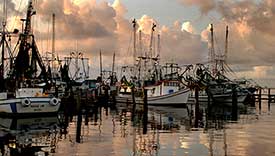Wildlife management is often thought of in terms of protecting, enhancing, and nurturing wildlife populations and the habitat needed for their well-being. However, many species at one time or another require management actions to reduce conflicts with people or with other wildlife species. Examples include a biologist trapping an abundant predator or competing species to enhance survival of an endangered species, a farmer excluding deer from an agronomic field that provides a livelihood, or removal of pigeons from a downtown building.
Our wildlife resources are incredibly valuable to Mississippians. Whether you are a hunter, bird watcher, or just enjoy nature, wildlife touches all of our lives. The benefits we get from wildlife don't come by accident, they are a result of careful planning and management. These pages include information about how you can better manage our wildlife resources. If, after exploring these pages, you still have questions about Mississippi's wildlife, please contact your county extension office.
The quality of our natural resources reflects our quality of life. MSU scientists and agents educate Mississippians about water quality issues, such as wastewater management, proper disposal of chemicals and waste, and the many human and animal activities that affect our ground and drinking water systems. Whether they’re addressing a backyard well or the Gulf of Mexico, these experts are ready to provide science-based solutions to pressing challenges.
Mississippians across the state expect to be able to turn on a faucet and have immediate access to clean and safe drinking water. But residents in rural areas often depend on local water associations or personal wells for their water. The MSU Extension Service supports rural water association members through training, technical assistance, and educational materials.
Water is a resource of international concern. From a glass of water on a hot day to the devastation caused by flooding, water touches our lives in numerous ways. Agents and specialists with the MSU Extension Service help Mississippians with water issues such as crop irrigation, conservation, waste management, recreation, water associations, and wells, providing them with science-based information to meet their needs.
No one really likes to talk about trash or ways to deal with human and animal waste. But when you look around, it’s easy to see how managing sewage, trash, litter, and animal byproducts is an important part of keeping Mississippi beautiful. Whether it’s practicing a “leave no trace” policy when you go hiking and camping or finding ways to deal with livestock waste on the farm, MSU experts share research-based information to help Mississippians make practical decisions.
Streams, ponds, and rivers. Forestlands, farmlands, and wetlands. Wildlife and fisheries. Mississippi has abundant and diverse natural resources, and many people in the state leverage these resources for business and pleasure. The MSU Extension Service works with stakeholders, state agency partners, and citizens of all ages to explore, study, manage, and conserve these natural resources while finding ways to put them to use in positive ways.
In addition to being the cultural and historical foundation for many coastal communities, the Mississippi seafood industry is a major contributor to the regional economy.
The Mississippi seafood industry has an annual economic impact of over $377 million and provides employment for over 8,500 people. Major species produced are shrimp, crabs, oysters, and finfish.
Mississippi Seafood Industry
The seafood industry comprises commercial harvesting, processing, importing, wholesaling, and retailing establishments.

